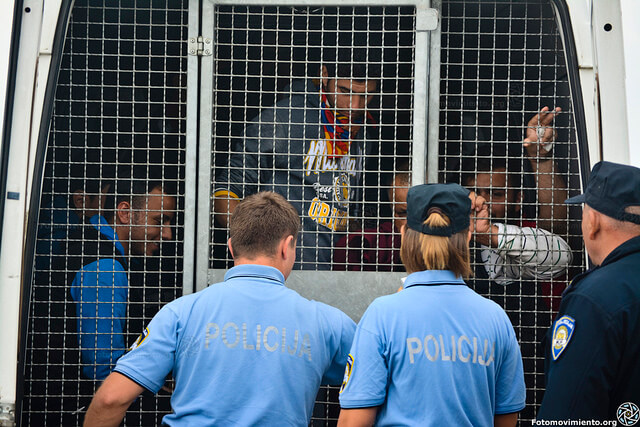The Border Violence Monitoring Network has published a report which includes updates and a summary of recent policy developments related to violence and practices of push-backs at the borders of Croatia, Bosnia and Herzegovina, Greece, Hungary, Slovenia and Serbia.
The situation at the Croatian border with Bosnia Herzegovina is particularly highlighted. This includes changes of the locations where pushbacks are happening and where people are returned to, which often leaves them further from material and medical assistance. The report finds that as part of systematic push-back practices, the prevalence of testimonies describing Croatian authorities burning the belongings of people transiting continued. Witnesses described Croatian police officers burning clothes, sleeping bags, backpacks and tents in addition to targeting other material possessions such as mobile phones, power banks, and personal documents.
The report also makes the point that pushbacks from Croatia to Bosnia Herzegovina are organized and coordinated as people who are apprehended are merged with other groups and their transport (often over more than 150 km). This results in delays and waiting periods which lengthen the amount of time people-in-transit spend in police vans. The report mentions testimonies of the drive in the police van as: overcrowded, overheated, overly long, with low levels of oxygen and reckless driving that cause the people inside to faint and vomit.
The increasing number of reports concerning the denial of access to the asylum procedures by Croatian authorities and the return of large numbers of asylum seekers to the border with Bosnia-Herzegovina, where they are forced to leave the country has been recognized in legal proceedings. In July 2019, the Federal Administrative Court of Switzerland ruled to suspend the transfer of an asylum applicant to Croatia under the Dublin Regulation due to the current situation of summary returns at the Croatian border with Bosnia-Herzegovina.
Apart from the practices on the Croatian border with Bosnia Herzegovina, the report highlights that during the month of July, several groups described instances of Slovenian police using police dogs to subdue and/or harm people-in-transit. For Serbia, it is recorded that transit groups in Šid not only face violence from Croatian authorities during their transit attempts, but also Serbian authorities. More recently, testimonies of violence perpetrated by unidentified groups of Serbians upon the return of people have been recorded.
Pushbacks affecting the transit community in Northern Greece at the Albanian, Macedonian and Turkish borders have been reported as well. From respondents testimony, the following five stages can be discerned: 1) Apprehension by police inside Greek territory 2) Transportation to a detention center 3) Confiscation of personal belongings and illegal detention 4) Transfer to another group where masked men or men wearing military clothing are present 5) Collective expulsion across the Evros River.
For further information:
- AIDA, 2018 Update: Croatia, March 2019
- ECRE, Clashes at Croatian-Bosnian Border, 2 November 2018
- AIDA, Access to Protection in Europe, October 2018
- ECRE, Push backs and police violence on the rise at Croatian border, report finds, March 2018
Photo: (cc) Fotomovimiento, September 2015
This article appeared in the ECRE Weekly Bulletin . You can subscribe to the Weekly Bulletin here.

